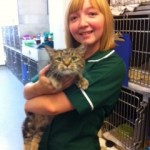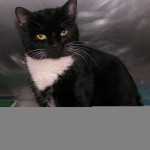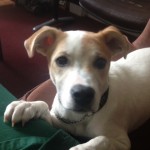Congratulations to Claire, who has just passed her final practical exam in her training to be a qualified veterinary nurse. Both our Ealing and Hounslow surgeries are training centres for veterinary nurses. This involves significant time commitments from our more senior qualified nurses, but is well worth it to maintain our high levels of nursing care for all our patients. To train to be a qualified nurse takes about 3 years of study and practical tests, with 3 theory examinations and one practical exam- it’s a lot of hard work. Qualifying enables her to wear a qualified nurse’s green uniform. Here she is modelling it!
Well done Claire!
Category Archives: Uncategorized
Chiswick Young Veterinary Partnership open day
Jack Russell Terrier cross found
Cat found in Turnham Green Chiswick
A cat was found outside our Chiswick surgery. Do you recognise him?
The cat is male, entire, fairly young, not chipped & no collar. Markings are black with 4 white feet, white under chin and white whiskers.
He was found outside our Turnham Green surgery on the 29th April. Please phone Young Veterinary Partnership on 0208 5670711 for further information.
Pet of the Month
Meet Mr Bond, James Bond… Pet of the Month for March. After a mission that must have backfired somewhat, James was brought into the surgery as a stray with a badly broken leg. We assume he was injured by a car during an important assignment, but we cannot be sure as he won’t tell us. He is a secret agent after all…
The femur of his left leg was broken in 2 places (see x-ray) and he was in considerable pain.
Mr Young repaired the fractures by placing pins inside the fractured pieces of bones to hold them together. The pins are held in place by an external fixator (visible on the photo) to ensure the bones will heal together straight.
Now he is in our hospital recuperating from his ordeal and waiting for that special someone willing to give this loving boy a new home! James Bond is approximately 3-4 years old, neutered and, apart from his accident, perfectly healthy. He will need to be cage-rested while the external fixator is still in place (until end of March). Like his human equivalent 007 he has got all female staff at his beck and call and we’re sure he will make a great pet.
To arrange a meeting with Mr Bond, speak to a member of staff.
Christmas opening times
CHRISTMAS AND NEW YEAR OPENING TIMES
Our 24 hour emergency service will run as normal
over the Christmas and New Year period from our Ealing Surgery.
Please call 020 8567 2724/0711 for details
SURGERY OPENING TIMES
24/12/12 All surgeries will close at 4.00pm
Christmas Day Emergency Service Only
Boxing Day Emergency Service Only – Emergency Consults
From 10.00am -11.00am
27/12/12 Normal Opening Hours
28/12/12 Normal Opening Hours
29/12/12 Normal Opening Hours
30/12/12 Emergency Service Only – Emergency Consults
From 10.00am – 11.00am
New Years Eve All surgeries will close at 4.00pm
New Years Day Emergency Service Only – Emergency Consults
From 10.00am – 11.00am
02/01/13 Normal opening hours
We wish you all a happy Christmas and send you our best wishes for the New Year!
Fatal cat disease confirmed in kittens
Our vets have recently seen 2 unvaccinated kittens from West London, which were being rescued, which developed diarrhoea, and dehydration. Both kittens died rapidly. This was due to a viral infection called Feline infectious enteritis. There is no specific treatment available for this virus, and many cases will die despite supportive treatment with antibiotics and fluids, with severe bloody diarrhoea and vomiting. The virus (called a parvovirus) is highly contagious, is resistant to many disinfectants, and can persist in the environment for long periods, possibly years in some cases. If infected cats survive they can continue to be infectious for at least 6 weeks, excreting the virus into the environment, and so spreading the disease.
There is a similar virus (parvovirus) that can affects dogs, with very similar symptoms, which is also usually rapidly fatal. Each virus is species specific, so the cat virus will not infect dogs and vice versa. The canine parvovirus can also persist for long periods in the environment, and is resistant to many disinfectants.
Vaccination will protect against both fatal diseases, and we recommend all dogs and cats are vaccinated regularly (even indoor cats), to keep them safe. With more unwanted, unvaccinated and potentially infectious cats on the streets we are concerned we may see more of this fatal but preventable disease.
Fear of fireworks in dogs- Video clip
Fear of fireworks in dogs
This is a short video clip of the use of a pheromone- Adaptil- for firework related anxiety in dogs.

Firework related pet anxiety
More than 80% of owners say their pet is afraid of firework noises. Signs of stress in dogs include trembling, shaking, hiding behind furniture, barking excessively, and trying to run away. Cats are much better at hiding their anxiety, but symptoms may include excessive meowing, refusal to eat, hiding, or vertical scratching and spraying.
Often mild reactions to fireworks can be managed with a pheromone (scent) spray; called Feliway in cats and Adaptil in dogs. These products can be purchased from our surgeries.
More severe reactions in dogs may be managed with a combination of sound desensitisation, using CD’s such as Soundsscary, and Adaptil. Occasionally tranquilizers may be prescribed after consultation with your vet, but these are generally used as a last resort.
Further tips for reducing firework anxiety include:
i. Provide a den or hiding place; this works best if it is a place previously chosen by your pet when they have been frightened before.
ii. Plug a Feliway diffuser or Adaptil diffuser close to the den at least a few days before the fireworks start.
iii. Try to ignore behaviour such as whining and crying, panting or pacing. Pets can pick up on their owner’s anxiety, and if you try to soothe them it can reinforce the belief that fireworks are something to be afraid of. It is also important not to scold them.
iv. Close doors and windows, close curtains and turn on music or the TV to mask some of the noises.
v. Keep cats indoors and have them microchipped in case they escape.
Please contact any of our surgeries in West London for further information or a consultation. Please see www.youngvets.co.uk for contact details.
Chiswick House Gardens Dog Show Sunday 23rd September
Chiswick House Gardens Dog Show in association with Chiswick House Organised Dog Walkers (CHOW) Sunday 23rd September 2012
Young Veterinary Partnership will once again sponsor this very popular annual local event for the whole community held at Chiswick House. Last year more than 1500 visitors enjoyed the many fun classes on offer as well as the wide range of stalls and other entertainments present. The show provides the perfect opportunity for everyone to celebrate the variety of the canine community in a fun and safe environment and all dogs are welcome to take part, as well as visitors without dogs. All proceeds are donated to improve dog-related facilities within the gardens. Come and join in!





